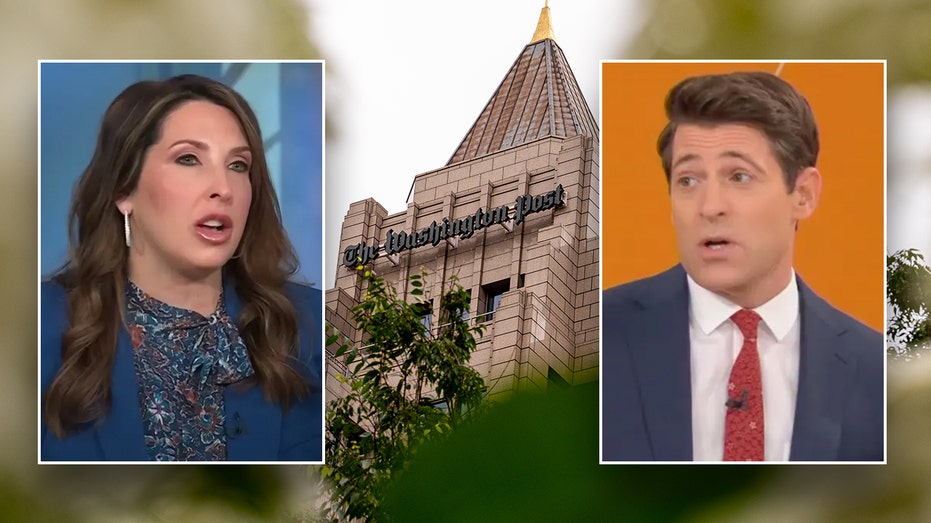2024: From the Washington Post to CBS News, it was the year of the liberal newsroom revolt
2024 was the year of the liberal newsroom revolt from staffer freakout of NBC's hiring of Ronna McDaniel to the chaos that erupted over The Washington Post's non-endorsement.

There has been a growing trend at legacy media organizations where progressive staffers ignite a war with their employers over an editorial position that does not align with their own.
Among the most memorable clashes in recent years include the social media revolt by New York Times staffers over the infamous Tom Cotton op-ed in 2020 and the open attacks by CNN employees over the network's Trump town hall in 2023.
In 2024, that trend exploded across multiple news outlets. These were the biggest newsroom revolts of the year:
NBC News was engulfed in a firestorm fueled by its own staffers after the network announced in March it had hired former Republican National Committee chair Ronna McDaniel as a contributor.
The practice of major news organizations hiring ex-lawmakers, government officials and political insiders has existed for decades and has largely been non-controversial. But a chorus of NBC talent, particularly from its liberal cable arm MSNBC, publicly disavowed McDaniel's hiring, citing her alleged actions in trying to block the certification of Michigan's election results in 2020.
"We weren’t asked our opinion of the hiring, but if we were, we would have strongly objected to it for several reasons including, but not limited to, as lawyers might say, Ms. McDaniel’s role in Donald Trump’s fake elector scheme and her pressuring election officials to not certify election results while Donald Trump was on the phone," MSNBC's Joe Scarborough said on "Morning Joe."
Rachel Maddow, MSNBC's biggest star, blasted NBC's "inexplicable" decision to hire McDaniel and expressed hope that the network would reverse its decision.
Several among the network's liberal talent, including Chuck Todd, Nicolle Wallace, Joy Reid and Jen Psaki, also spoke out against the move. Todd memorably fumed on "Meet the Press" after colleague Kristen Welker interviewed McDaniel, in what turned out to be her only appearance as a contributor.
"I think our bosses owe you an apology for putting you in this situation, because I don't know what to believe," he said.
MSNBC STARS SHOOT INSIDE THE TENT, ATTACK NBC FOR HIRING EX-RNC CHAIR RONNA MCDANIEL: ‘INEXPLICABLE’
Just four days after NBC News announced McDaniel's hiring, she was terminated.
"There is no doubt that the last several days have been difficult for the News Group," NBCUniversal News Group Chairman Cesar Conde told staff in a memo. "After listening to the legitimate concerns of many of you, I have decided that Ronna McDaniel will not be an NBC News contributor."
Conde acknowledged McDaniel's hiring had undermined the goal of a "cohesive and aligned" newsroom and offered an apology to his staff.
"I want to personally apologize to our team members who felt we let them down," Conde wrote. "While this was a collective recommendation by some members of our leadership team, I approved it and take full responsibility for it."
In October, the left-wing staff at CBS News lashed out at their colleague, "CBS Mornings" co-host Tony Dokoupil, over his tough but civil interview exchange with progressive author Ta-Nehisi Coates.
Dokoupil, who is Jewish and has children living in Israel, grilled Coates, whose new book "The Message" is harshly critical of Israel and has been rebuked by the Jewish state's defenders for its shallow analysis of a complicated conflict.
"The content of that section would not be out of place in the backpack of an extremist," Dokoupil told Coates about one portion about his trip to Israel and the Palestinian territories, asking him "Why leave out so much" and "What is it that so particularly offends you about the existence of a Jewish state that is a Jewish safe place?"
CBS leadership reassured offended staff members that following a review, they concluded that the interview did not meet the company’s "editorial standards," the Free Press reported, which obtained audio of the staff meeting.
While a source familiar with the matter told Fox News Digital that Dokoupil would not be punished over the interview, he was forced to meet with the network’s in-house Race and Culture Unit following complaints. According to The New York Times, the conversation "focused on Mr. Dokoupil’s tone of voice, phrasing and body language" during the interview.
The New York Post also reported that Dokoupil expressed regret to staffers at a meeting, with one network insider describing it, "There were tears. [People were] very upset."
Some have rallied in his defense, like CBS News legal correspondent Jan Crawford, who went to bat for him during a network conference call, and Shari Redstone, chair of CBS News' parent company Paramount Global, who called the network's handling of Dokoupil a "mistake." CBS CEO George Cheeks issued a memo standing by the news network's leadership.
Some of the country's most prominent newspapers made their own headlines by ending their decades-long practice of endorsing presidential candidates.
The Los Angeles Times kicked off the movement with a decision made by its owner, Dr. Patrick Soon-Shiong for the paper to not make any endorsement in the 2024 race. Upset that they couldn't formally put their support behind Vice President Kamala Harris, that led to a slew of resignations, including by Times editorials editor Mariel Garza and editorial board members Robert Greene and Karin Klein.
Times columnist Harry Litman offered his resignation in December, citing the paper's "shameful capitulation" to Trump after Soon-Shiong made overtures to moderate the paper, like bringing aboard conservative commentator Scott Jennings to its revamped editorial board.
Days after the Times, The Washington Post announced it would no longer make endorsements in presidential races. The paper's billionaire owner Jeff Bezos halted the editorial board's planned endorsement of Harris as well – the Post had endorsed the Democrat in every presidential election since 1976 except for when it omitted any endorsement at all in 1988.
That move sparked an avalanche of outrage from the Post's union to its prominent columnists, 20 of whom signed an open letter denouncing the paper's decision. Multiple editorial board members stepped down, and the Post's editor-at-large Robert Kagan resigned.
Not only did the Post suffer internal bleeding, it sparked a boycott movement among its liberal readers. The paper reportedly lost 250,000 paid subscribers as a result, and it was already on track to lose $77 million this year.
Bezos penned an op-ed defending the decision, citing growing distrust in the media.
"We must be accurate, and we must be believed to be accurate. It’s a bitter pill to swallow, but we are failing on the second requirement," Bezos wrote. "Most people believe the media is biased. Anyone who doesn’t see this is paying scant attention to reality, and those who fight reality lose. Reality is an undefeated champion. It would be easy to blame others for our long and continuing fall in credibility (and, therefore, decline in impact), but a victim mentality will not help. Complaining is not a strategy. We must work harder to control what we can control to increase our credibility."
"By itself, declining to endorse presidential candidates is not enough to move us very far up the trust scale, but it’s a meaningful step in the right direction. I wish we had made the change earlier than we did, in a moment further from the election and the emotions around it. That was inadequate planning, and not some intentional strategy," Bezos later conceded.



